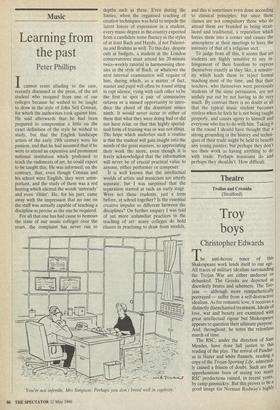Music
Learning from the past
Peter Phillips
Icannot resist alluding to the case, recently discussed in the press, of the art student who resigned from one of our colleges because he wished to be taught to draw in the style of John Sell Cotman, for which the authorities took against him. He said afterwards that he had been prepared to compromise a little on the exact definition of the style he wished to study, but that the English landscape artists of the early 19th century were his passion, and that he had assumed that if he were to attend an expensive and prominent national institution which professed to teach the rudiments of art, he could expect to be taught this. He was informed, on the contrary, that, even though Cotman and his school were English, they were unim- portant, and the study of them was a red herring which elicited the words `untrendy' and even 'elitist'. He, for his part, came away with the impression that no one on the staff was actually capable of teaching a discipline as precise as the one he required.
For all that one has had cause to bemoan the state of our music colleges over the years, the complaint has never run to 'You're not infertile, Mrs Simpson. Perhaps you don't breed well in captivity.'
depths such as these. Even during the Sixties, when the organised teaching of creative techniques was held to impede the latent forces of expression in a student, every music degree in the country expected from a candidate some fluency in the styles of at least Bach and Haydn, if not Palestri- na and Brahms as well. To this day, despite cuts in budgets, a student at the London conservatoires must attend his 20-minute twice-weekly tutorial in harmonising chor- ales in the style of Bach, or whatever the next internal examination will require of him, during which, as a matter of fact, master and pupil will often be found sitting in rapt silence, vying with each other to be the first to spot a pair of consecutive octaves or a missed opportunity to intro- duce the chord of the dominant minor ninth. It would never occur to either of them that what they were doing had or did not have éclat, or that this highly special- ised form of training was or was not elitist. The hope which underlies such a routine is that the student will gain insight into the minds of the great masters, so appreciating their work the more, even though it is freely acknowledged that the information will never be of crucial practical value to anyone, either performer or composer.
It is well known that the intellectual worlds of artists and musicians are utterly separate; but I was surprised that the separation started at such an early stage. Were not these students, just a term before, at school together? Is the essential creative impulse so different between the disciplines? On further enquiry I was told of yet more unfamiliar practices in the teaching of art: many colleges do hold classes in practising to draw from models, and this is sometimes even done according to classical principles; but since these classes are not compulsory those who do attend them are branded as being strait- laced and traditional, a reputation which forces them into a corner and causes the atmosphere at their meetings to have the intensity of that of a religious sect.
To judge from all this, it seems that art students are highly sensitive to any in- fringement of their freedom to express themselves exactly as they like, a sensitiv- ity which leads them to reject formal teaching most of the time, and that their teachers, who themselves were previously students of the same persuasion, are not unduly put out by not having to do very much. By contrast there is no doubt at all that the typical music student becomes restless when he feels he is not being taught properly, and causes agony to himself and everyone who has to do with him. Taking it in the round I should have thought that a strong grounding in the history and techni- ques of their trade might be held to benefit any young painter; but perhaps they don't see their work as having anything to do with trade. Perhaps musicians do and perhaps they shouldn't. How difficult.




























































 Previous page
Previous page